Unit 8 单元复习课件(鲁教版九年级全册)
文档属性
| 名称 | Unit 8 单元复习课件(鲁教版九年级全册) |
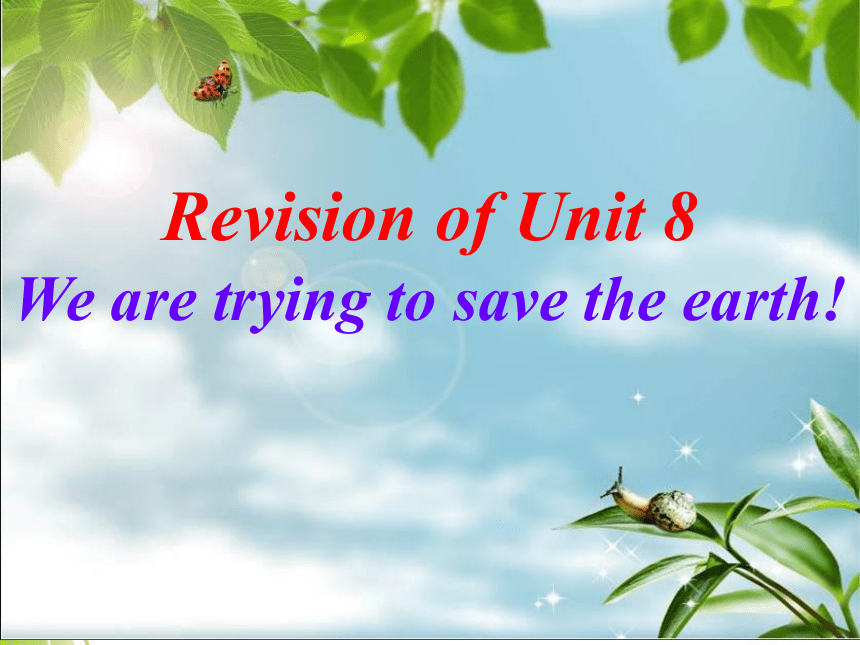
|
|
| 格式 | zip | ||
| 文件大小 | 181.1KB | ||
| 资源类型 | 试卷 | ||
| 版本资源 | 鲁教版 | ||
| 科目 | 英语 | ||
| 更新时间 | 2023-07-20 00:00:00 | ||
图片预览

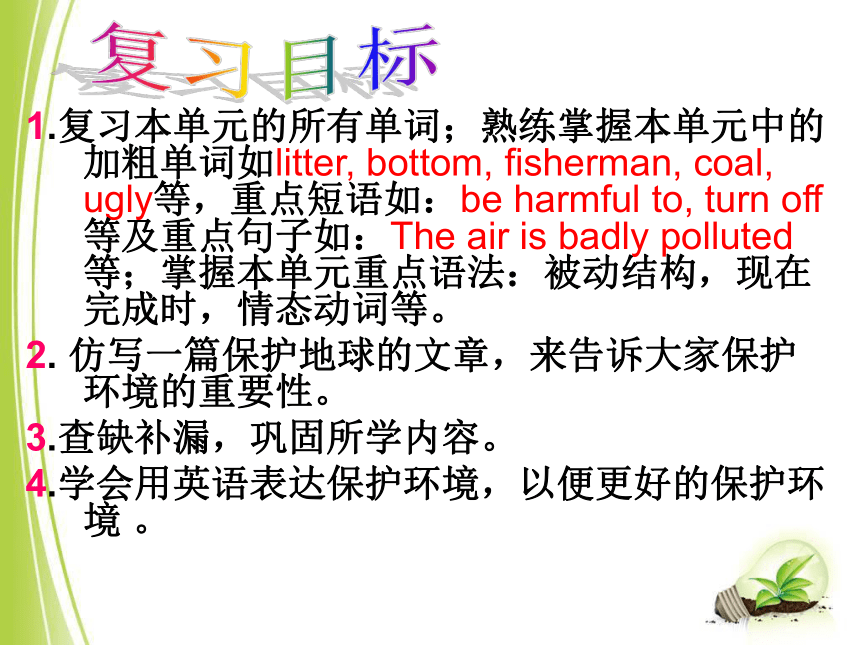
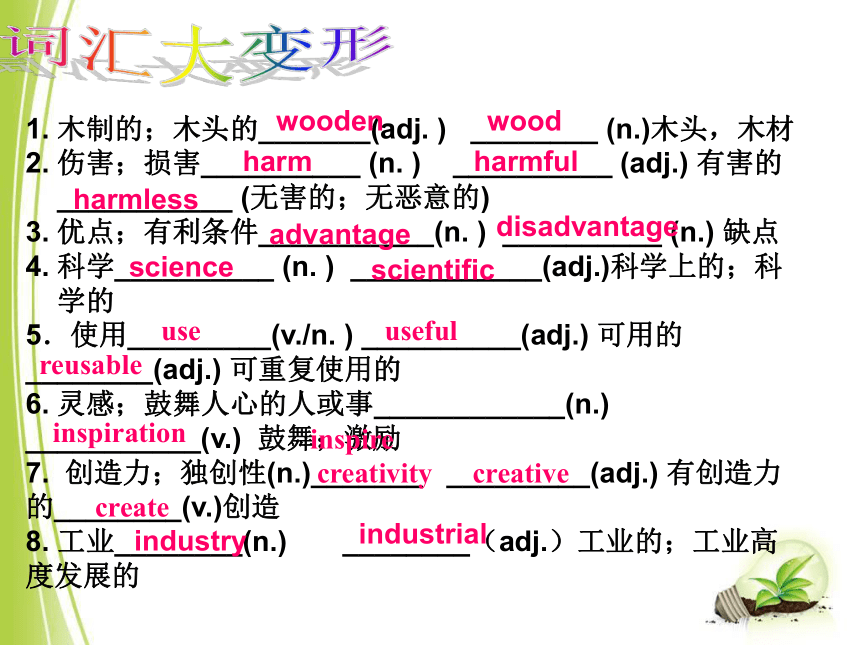
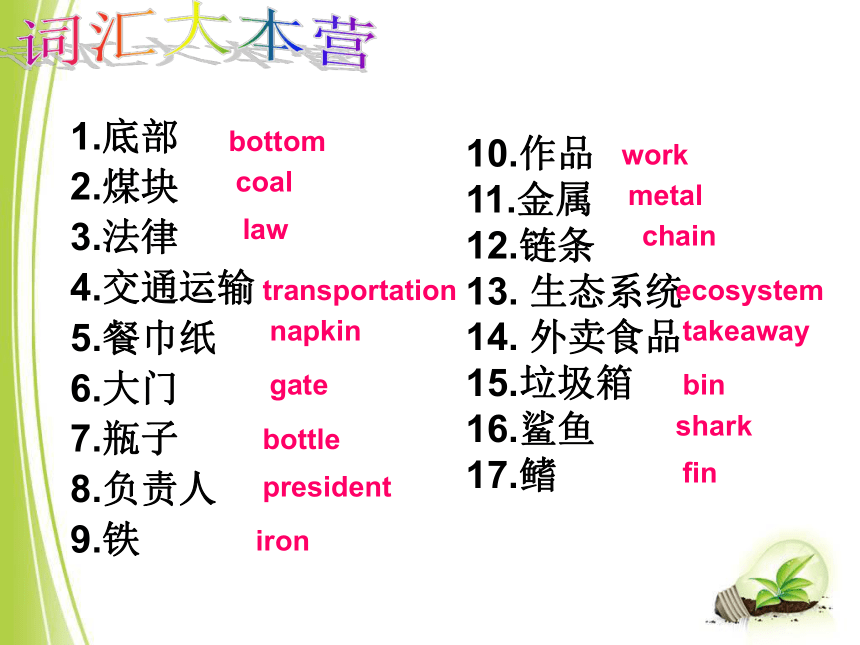
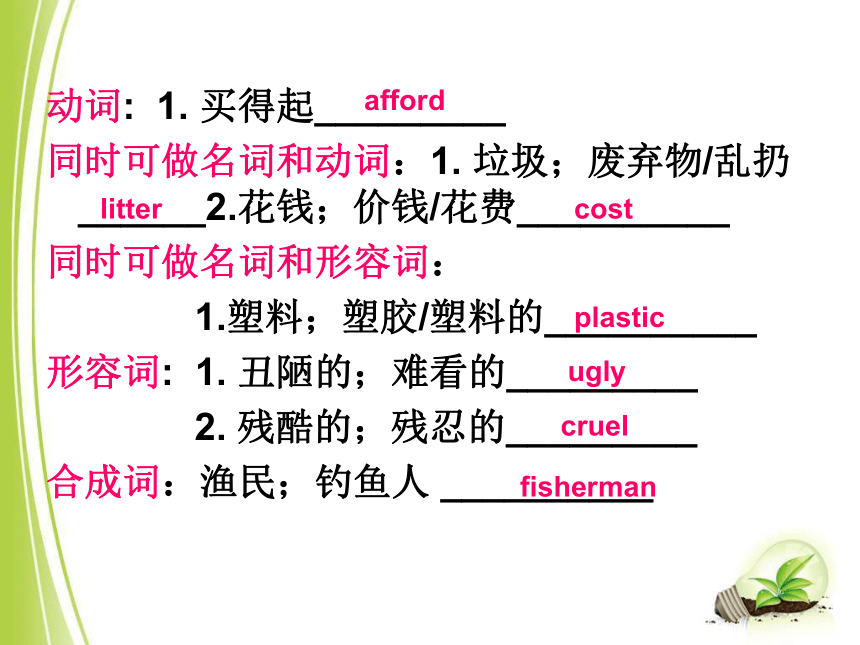
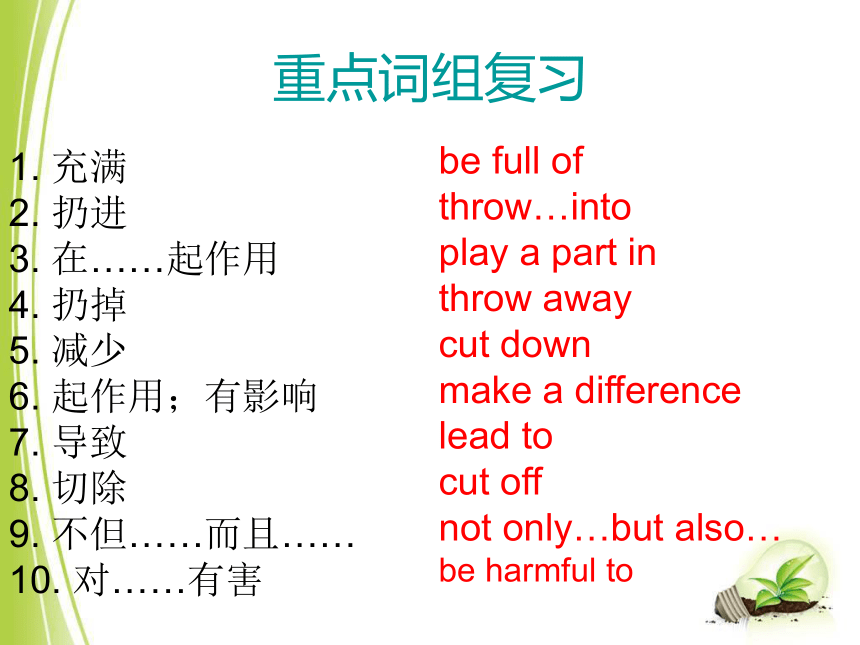
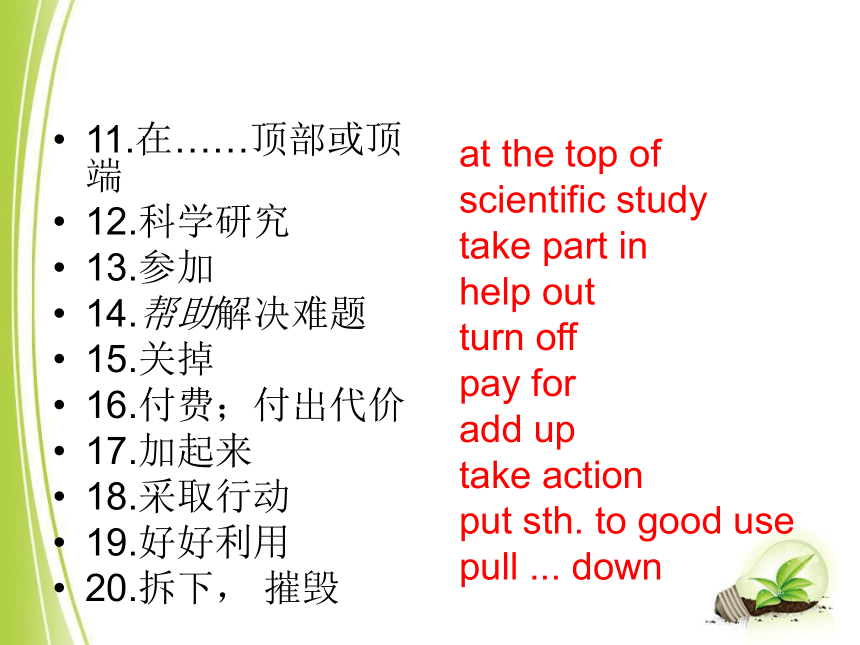
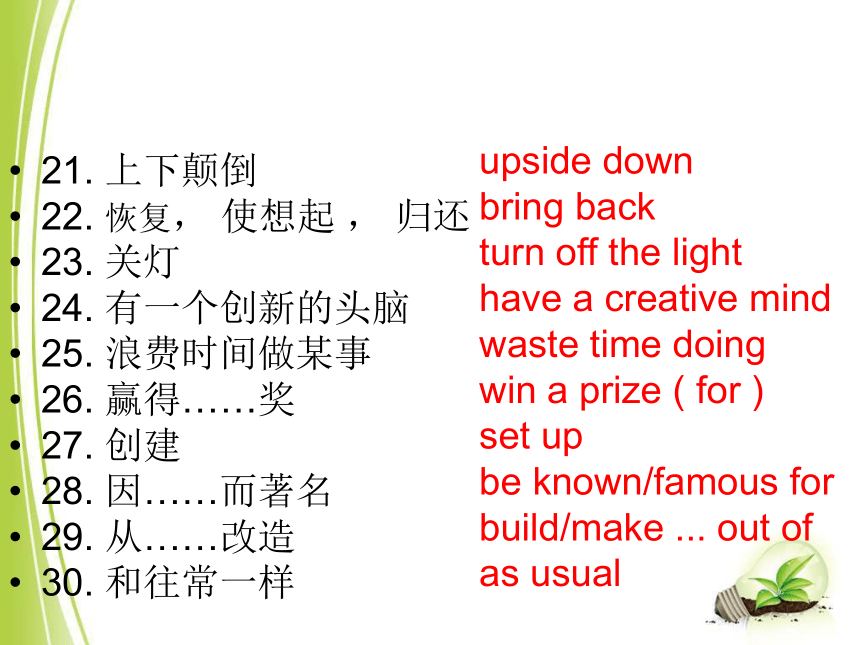
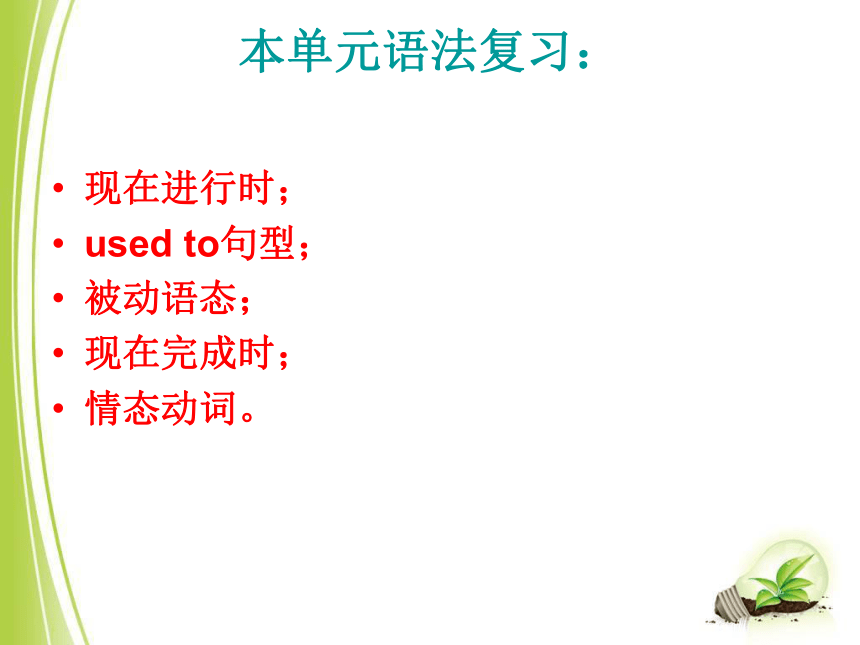
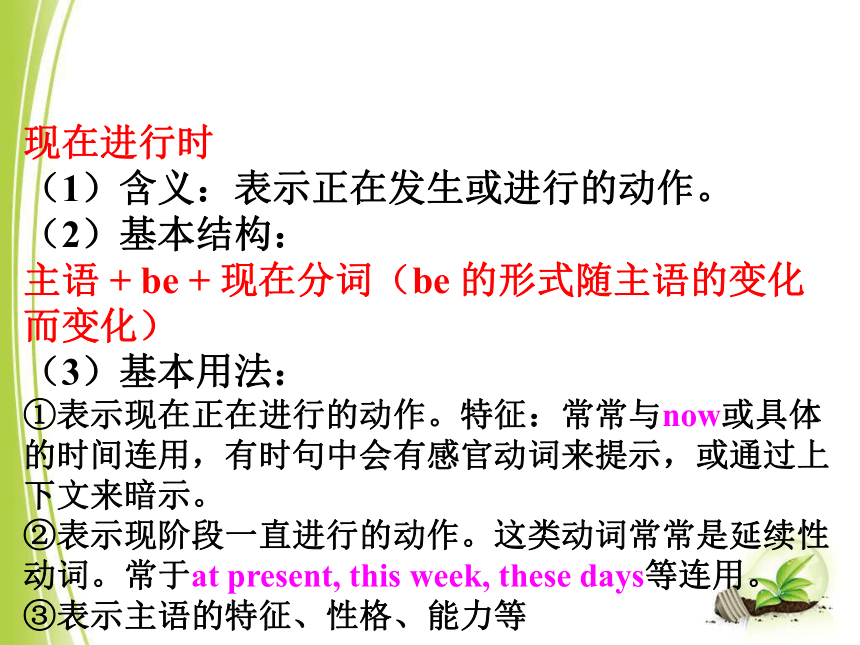
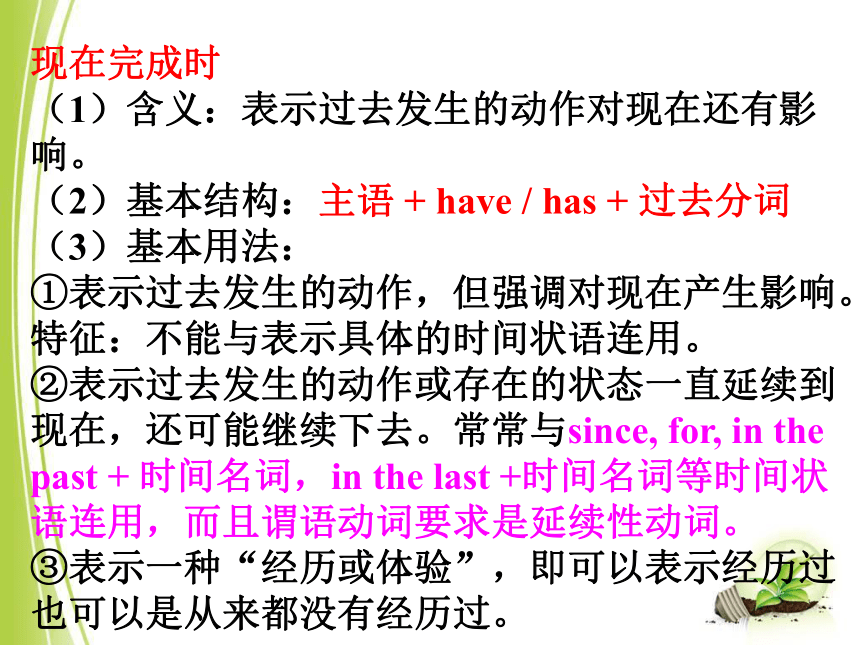
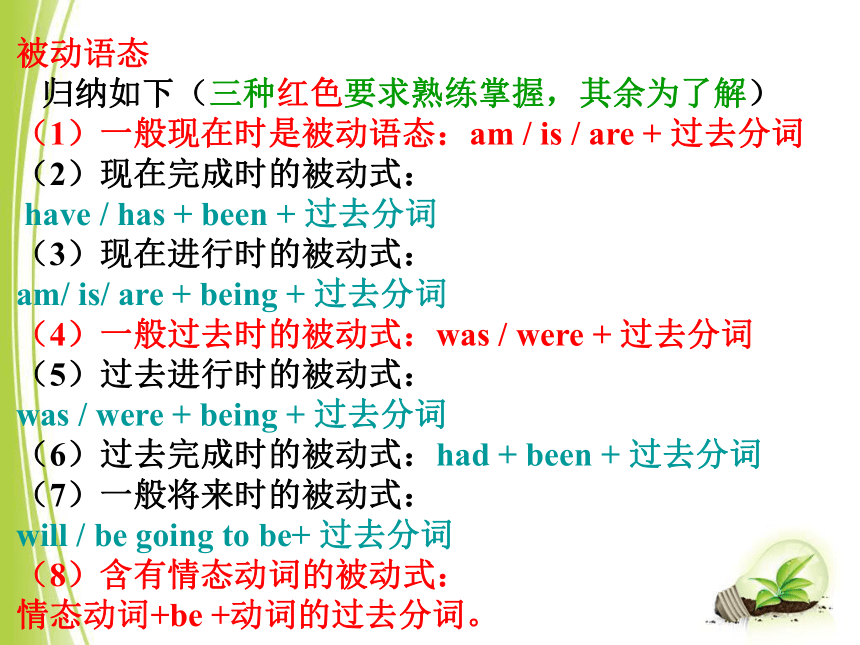
文档简介
(共33张PPT)
Revision of Unit 8
We are trying to save the earth!
1.复习本单元的所有单词;熟练掌握本单元中的加粗单词如litter, bottom, fisherman, coal, ugly等,重点短语如:be harmful to, turn off等及重点句子如:The air is badly polluted 等;掌握本单元重点语法:被动结构,现在完成时,情态动词等。
2. 仿写一篇保护地球的文章,来告诉大家保护环境的重要性。
3.查缺补漏,巩固所学内容。
4.学会用英语表达保护环境,以便更好的保护环境 。
1. 木制的;木头的_______(adj. ) ________ (n.)木头,木材
2. 伤害;损害__________ (n. ) __________ (adj.) 有害的
___________ (无害的;无恶意的)
3. 优点;有利条件___________(n. ) __________ (n.) 缺点
4. 科学__________ (n. ) ____________(adj.)科学上的;科
学的
5.使用_________(v./n. ) __________(adj.) 可用的 ________(adj.) 可重复使用的
6. 灵感;鼓舞人心的人或事____________(n.) ___________(v.) 鼓舞;激励
7. 创造力;独创性(n.)_______ _________(adj.) 有创造力的________(v.)创造
8. 工业________(n.) ________(adj.)工业的;工业高 度发展的
wooden
wood
harm
harmful
harmless
advantage
disadvantage
science
scientific
use
useful
reusable
inspiration
inspire
creativity
creative
create
industry
industrial
1.底部
2.煤块
3.法律
4.交通运输
5.餐巾纸
6.大门
7.瓶子
8.负责人
9.铁
bottom
coal
law
transportation
napkin
gate
bottle
president
iron
10.作品
11.金属
12.链条
13. 生态系统
14. 外卖食品
15.垃圾箱
16.鲨鱼
17.鳍
work
metal
chain
ecosystem
takeaway
bin
shark
fin
动词: 1. 买得起_________
同时可做名词和动词:1. 垃圾;废弃物/乱扔 ______2.花钱;价钱/花费__________
同时可做名词和形容词:
1.塑料;塑胶/塑料的__________
形容词: 1. 丑陋的;难看的_________
2. 残酷的;残忍的_________
合成词:渔民;钓鱼人 __________
afford
litter
cost
plastic
ugly
cruel
fisherman
重点词组复习
1. 充满
2. 扔进
3. 在……起作用
4. 扔掉
5. 减少
6. 起作用;有影响
7. 导致
8. 切除
9. 不但……而且……
10. 对……有害
be full of
throw…into
play a part in
throw away
cut down
make a difference
lead to
cut off
not only…but also…
be harmful to
11.在……顶部或顶端
12.科学研究
13.参加
14.帮助解决难题
15.关掉
16.付费;付出代价
17.加起来
18.采取行动
19.好好利用
20.拆下, 摧毁
at the top of
scientific study
take part in
help out
turn off
pay for
add up
take action
put sth. to good use
pull ... down
21. 上下颠倒
22. 恢复, 使想起 , 归还
23. 关灯
24. 有一个创新的头脑
25. 浪费时间做某事
26. 赢得……奖
27. 创建
28. 因……而著名
29. 从……改造
30. 和往常一样
upside down
bring back
turn off the light
have a creative mind
waste time doing
win a prize ( for )
set up
be known/famous for
build/make ... out of
as usual
本单元语法复习:
现在进行时;
used to句型;
被动语态;
现在完成时;
情态动词。
现在进行时
(1)含义:表示正在发生或进行的动作。
(2)基本结构:
主语 + be + 现在分词(be 的形式随主语的变化而变化)
(3)基本用法:
①表示现在正在进行的动作。特征:常常与now或具体的时间连用,有时句中会有感官动词来提示,或通过上下文来暗示。
②表示现阶段一直进行的动作。这类动词常常是延续性动词。常于at present, this week, these days等连用。
③表示主语的特征、性格、能力等
现在完成时
(1)含义:表示过去发生的动作对现在还有影响。
(2)基本结构:主语 + have / has + 过去分词
(3)基本用法:
①表示过去发生的动作,但强调对现在产生影响。特征:不能与表示具体的时间状语连用。
②表示过去发生的动作或存在的状态一直延续到现在,还可能继续下去。常常与since, for, in the past + 时间名词,in the last +时间名词等时间状语连用,而且谓语动词要求是延续性动词。
③表示一种“经历或体验”,即可以表示经历过也可以是从来都没有经历过。
被动语态
归纳如下(三种红色要求熟练掌握,其余为了解)
(1)一般现在时是被动语态:am / is / are + 过去分词
(2)现在完成时的被动式:
have / has + been + 过去分词
(3)现在进行时的被动式:
am/ is/ are + being + 过去分词
(4)一般过去时的被动式:was / were + 过去分词
(5)过去进行时的被动式:
was / were + being + 过去分词
(6)过去完成时的被动式:had + been + 过去分词
(7)一般将来时的被动式:
will / be going to be+ 过去分词
(8)含有情态动词的被动式:
情态动词+be +动词的过去分词。
情态动词
情态动词表示说话人对某一动作或状态的态度,如认为“可能”、“应当”、“必要”等。情态动词本身有一定的意义,但不能单独作谓语,也没有人称和数的变化。后面一般跟动词原形。
used to 结构
used to意为“过去常常做某事”,指的是过去的习惯性动作,目的在于与现在形成对照。used to是个情态动词,其中的to是不定式符号,后面跟动词原形。在美式英语中。它的疑问式是:Did +主语+use to do sth.?否定式是:主语+didn't use..。在英式英语中,它的疑问式应当是:Used +主语+to sth.?否定式应当是used not to或use(d)n't to。
He used to stay up late. 他过去常熬到很晚。
used to 结构
used to意为“过去常常做某事”,指的是过去的习惯性动作,目的在于与现在形成对照。used to是个情态动词,其中的to是不定式符号,后面跟动词原形。
在美式英语中(掌握)
它的疑问式是:Did +主语+use to do sth.
否定式是:主语+didn't use.
在英式英语中(了解)
它的疑问式应当是:Used +主语+to sth.
否定式应当是used not to.
1. harmful 形容词,意为“有害的”。常构成短语
be harmful to “对……有害的”。
Staying up often is harmful to your health. 经常熬夜对你的健康有害。
【拓展】
harm 名词,意为“害处”。常用构成短语
do harm to “对……有害”,相当于be harmful to.
Too much smoking does harm to his health. = Too much smoking is harmful to his health. 吸烟过多对他的健康有害。
Language points
2. 辨析:join, join in 和take part in
to
join 加入组织,团体,党派等,有作为其中的一个成员的含义;
后面也可以加表示人的名词,表示和某人一起参加某活动
join in 加入一种具体活动。
take aprt in 指参加会议或群众性活动等,着重说明句子主语参加该项活动并在活动中发挥作用。
例如:
Will you join us in the discussion
你参加我们的讨论吗?
She joined the Young Pioneers.
她加入了少先队。
Why didn't you join in the talk last night
昨晚你为什么没参加座谈?
Did you take part in the sports meet
你参加运动会了吗?
3. afford的用法
⑴ afford是动词,意为“买得起,担负得起”,通常与can, could, be able to连用,多用于否定句中。
They couldn’t afford $50 for a ticket. 他们拿不出50美元买一张票。
⑵ afford后面常跟带to的动词不定式。
We can’t afford to go abroad this summer. 今年夏天我们没有足够的钱出国。
4. Not only… but also…意为 “不但…而且…”
遵循一下三个原则
(a)并列连词,连接两个并列成分,其中also
可以省略。
(b) 主谓一致原则:not only…but also..连接两个
主语时,谓语动词在人称和数上要与but also
的主语保持一致。
(c) 倒装原则:not only…but also…连接两个并列分句时, not only 置于句首,表示强调,其引导的句子要用部分倒装,即将谓语动词的一部分(情态动词,助动词等)放在句子的前面,而but also后的句子用正常语序。
Not only he but also I am interested in pop music.
Not only do I feel good about helping people, but also I get to spend time doing what I love to do.
⑴ need doing=need to be done "需要被…"现在
分词doing表被动“需要被做”,相当于need
to be done。
My watch needs repairing. =My watch needs
to be repaired.我的表需要修了。
⑵ need后加不定式,证明need为实义动词,而
非情态动词,这时need有人称和数的变化。
He needs to get up early. 他需要早起。
5. 辨析:need to be done; need doing与need to do
七、书面表达
保护人类共同的家园----地球是每个人的责任和义务。我们在生活中的点滴小事上也能作出自己的贡献。根据表格内容,谈一谈你曾经为保护环境做过哪些努力,将来还打算如何去做。
1. 要求:不少于80词;
2. 要点齐全,行文连贯,条理清晰,可适当发挥。
turn off the lights when you leave a room
turn off the shower while washing hair
stop using paper napkins
take your own bags when shopping
stop riding in cars
ride a bike /recycle books and paper
With the global warming, more and more people realized the importance of protecting the environment.
It’s our duty to protect the earth. I always turn off the lights when I leave a room. While I am washing my hair, I usually turn off the shower. Besides, if I want to stop, I always take my own bags instead of using plastic bags. I have decided to do more things to protect our earth, such as recycling books and paper, stopping using paper napkins and stopping riding in cars.
It’s good for us to walk or ride bikes to school instead of riding cars. We can also plant more trees to change air around us.
Let’s take action! Our actions can make a difference and lead to a better future.
一. 根据汉语提示完成句子。
1. 我们必须采取行动来阻止他们。
We must _____ ______ to stop them.
2. 我从没听说过这个人。
I have never ____ ____ such a man.
3. 我们乐意尽力帮你摆脱困境。
We are glad to do what we can do ___ ___ ___.
4. 到目前为止,我已经交了二十个朋友。
____ ____, I have made twenty friends.
5. 实际上,她从没去过那儿。
____ ____, she has never been there.
In fact
take action
heard of
to help out
So far
6. 她扔掉了昨天的报纸。
She _____ _____ yesterday’s newspaper.
7. 我在新的工作中充分地利用了我的经验。
I ___ my experience ___ ___ ___ in my new work.
8. 请别将杯子倒置。
Please don’t turn the cup _____ _____.
9. 这些照片唤起了我美好的回忆。
The photos ____ ____ lots of good memories.
10. 杭州以龙井茶而闻名。
Hangzhou is well ____ ____ its Longjing Tea.
known for
threw away
put to good use
upside down
bring back
1. Mr. Wang is the _________(负责人) of the company.
2. The young man likes Lu Xun’s ______(作品).
3. Could you please give me a ______(瓶) of water
4. Tom! Someone is waiting for you at the school _____(大门).
5. We should ______ (回收)garbage, not burn it
president
works
bottle
gate
recycle
二,根据汉语提示写出下面句中所缺的单词。
1. (2013江苏淮安) It's getting dark. Please ________ the light.
A. turn on B. turn off
C. turn down D. turn around
2. (2013湖北随州)–How does Jack usually go to work
—He ______ drive a car, but now he ______ there to lose weight.
A. used to; is used to walk
B. was used to; is used to walking
C. was used to; is used to walk
D. used to; is used to walking
中考链接
3. (2013山东枣庄) In the last ten month, September Miracle(奇迹)____on CCTV for more than five times and is popular all over the country.
A. has played the piano
B. has given out their song disks
C .has written songs
D. has performed
4. (2013广东) Not only my friends but also I _______ interested in football and Messi is our favorite star.
A. be B. am C. is D. are
5. (2013湖北宜昌)—At present, one of the best ways to study is working in groups.
—More chances _______ to students to learn from each other.
A. offer B. are offered
C. have offered D. are offering 6.Look! The police ______ the food ontothe bank of the river. 【2014宜宾】
am carrying B. is carrying
C. are carrying D. are carried
7.—Mr. Li will check our homework this afternoon. ______ you ______ it 【2014南昌】
—Not yet. I'm doing it right now.
A. Do; finish B. Had; finished
C. Will; finish D. Have; finished
8.I heard that Line I of Ningbo Subway ______ last month. 【2014宁波】
A. was tested B. is tested
C. tests D. tested
Revision of Unit 8
We are trying to save the earth!
1.复习本单元的所有单词;熟练掌握本单元中的加粗单词如litter, bottom, fisherman, coal, ugly等,重点短语如:be harmful to, turn off等及重点句子如:The air is badly polluted 等;掌握本单元重点语法:被动结构,现在完成时,情态动词等。
2. 仿写一篇保护地球的文章,来告诉大家保护环境的重要性。
3.查缺补漏,巩固所学内容。
4.学会用英语表达保护环境,以便更好的保护环境 。
1. 木制的;木头的_______(adj. ) ________ (n.)木头,木材
2. 伤害;损害__________ (n. ) __________ (adj.) 有害的
___________ (无害的;无恶意的)
3. 优点;有利条件___________(n. ) __________ (n.) 缺点
4. 科学__________ (n. ) ____________(adj.)科学上的;科
学的
5.使用_________(v./n. ) __________(adj.) 可用的 ________(adj.) 可重复使用的
6. 灵感;鼓舞人心的人或事____________(n.) ___________(v.) 鼓舞;激励
7. 创造力;独创性(n.)_______ _________(adj.) 有创造力的________(v.)创造
8. 工业________(n.) ________(adj.)工业的;工业高 度发展的
wooden
wood
harm
harmful
harmless
advantage
disadvantage
science
scientific
use
useful
reusable
inspiration
inspire
creativity
creative
create
industry
industrial
1.底部
2.煤块
3.法律
4.交通运输
5.餐巾纸
6.大门
7.瓶子
8.负责人
9.铁
bottom
coal
law
transportation
napkin
gate
bottle
president
iron
10.作品
11.金属
12.链条
13. 生态系统
14. 外卖食品
15.垃圾箱
16.鲨鱼
17.鳍
work
metal
chain
ecosystem
takeaway
bin
shark
fin
动词: 1. 买得起_________
同时可做名词和动词:1. 垃圾;废弃物/乱扔 ______2.花钱;价钱/花费__________
同时可做名词和形容词:
1.塑料;塑胶/塑料的__________
形容词: 1. 丑陋的;难看的_________
2. 残酷的;残忍的_________
合成词:渔民;钓鱼人 __________
afford
litter
cost
plastic
ugly
cruel
fisherman
重点词组复习
1. 充满
2. 扔进
3. 在……起作用
4. 扔掉
5. 减少
6. 起作用;有影响
7. 导致
8. 切除
9. 不但……而且……
10. 对……有害
be full of
throw…into
play a part in
throw away
cut down
make a difference
lead to
cut off
not only…but also…
be harmful to
11.在……顶部或顶端
12.科学研究
13.参加
14.帮助解决难题
15.关掉
16.付费;付出代价
17.加起来
18.采取行动
19.好好利用
20.拆下, 摧毁
at the top of
scientific study
take part in
help out
turn off
pay for
add up
take action
put sth. to good use
pull ... down
21. 上下颠倒
22. 恢复, 使想起 , 归还
23. 关灯
24. 有一个创新的头脑
25. 浪费时间做某事
26. 赢得……奖
27. 创建
28. 因……而著名
29. 从……改造
30. 和往常一样
upside down
bring back
turn off the light
have a creative mind
waste time doing
win a prize ( for )
set up
be known/famous for
build/make ... out of
as usual
本单元语法复习:
现在进行时;
used to句型;
被动语态;
现在完成时;
情态动词。
现在进行时
(1)含义:表示正在发生或进行的动作。
(2)基本结构:
主语 + be + 现在分词(be 的形式随主语的变化而变化)
(3)基本用法:
①表示现在正在进行的动作。特征:常常与now或具体的时间连用,有时句中会有感官动词来提示,或通过上下文来暗示。
②表示现阶段一直进行的动作。这类动词常常是延续性动词。常于at present, this week, these days等连用。
③表示主语的特征、性格、能力等
现在完成时
(1)含义:表示过去发生的动作对现在还有影响。
(2)基本结构:主语 + have / has + 过去分词
(3)基本用法:
①表示过去发生的动作,但强调对现在产生影响。特征:不能与表示具体的时间状语连用。
②表示过去发生的动作或存在的状态一直延续到现在,还可能继续下去。常常与since, for, in the past + 时间名词,in the last +时间名词等时间状语连用,而且谓语动词要求是延续性动词。
③表示一种“经历或体验”,即可以表示经历过也可以是从来都没有经历过。
被动语态
归纳如下(三种红色要求熟练掌握,其余为了解)
(1)一般现在时是被动语态:am / is / are + 过去分词
(2)现在完成时的被动式:
have / has + been + 过去分词
(3)现在进行时的被动式:
am/ is/ are + being + 过去分词
(4)一般过去时的被动式:was / were + 过去分词
(5)过去进行时的被动式:
was / were + being + 过去分词
(6)过去完成时的被动式:had + been + 过去分词
(7)一般将来时的被动式:
will / be going to be+ 过去分词
(8)含有情态动词的被动式:
情态动词+be +动词的过去分词。
情态动词
情态动词表示说话人对某一动作或状态的态度,如认为“可能”、“应当”、“必要”等。情态动词本身有一定的意义,但不能单独作谓语,也没有人称和数的变化。后面一般跟动词原形。
used to 结构
used to意为“过去常常做某事”,指的是过去的习惯性动作,目的在于与现在形成对照。used to是个情态动词,其中的to是不定式符号,后面跟动词原形。在美式英语中。它的疑问式是:Did +主语+use to do sth.?否定式是:主语+didn't use..。在英式英语中,它的疑问式应当是:Used +主语+to sth.?否定式应当是used not to或use(d)n't to。
He used to stay up late. 他过去常熬到很晚。
used to 结构
used to意为“过去常常做某事”,指的是过去的习惯性动作,目的在于与现在形成对照。used to是个情态动词,其中的to是不定式符号,后面跟动词原形。
在美式英语中(掌握)
它的疑问式是:Did +主语+use to do sth.
否定式是:主语+didn't use.
在英式英语中(了解)
它的疑问式应当是:Used +主语+to sth.
否定式应当是used not to.
1. harmful 形容词,意为“有害的”。常构成短语
be harmful to “对……有害的”。
Staying up often is harmful to your health. 经常熬夜对你的健康有害。
【拓展】
harm 名词,意为“害处”。常用构成短语
do harm to “对……有害”,相当于be harmful to.
Too much smoking does harm to his health. = Too much smoking is harmful to his health. 吸烟过多对他的健康有害。
Language points
2. 辨析:join, join in 和take part in
to
join 加入组织,团体,党派等,有作为其中的一个成员的含义;
后面也可以加表示人的名词,表示和某人一起参加某活动
join in 加入一种具体活动。
take aprt in 指参加会议或群众性活动等,着重说明句子主语参加该项活动并在活动中发挥作用。
例如:
Will you join us in the discussion
你参加我们的讨论吗?
She joined the Young Pioneers.
她加入了少先队。
Why didn't you join in the talk last night
昨晚你为什么没参加座谈?
Did you take part in the sports meet
你参加运动会了吗?
3. afford的用法
⑴ afford是动词,意为“买得起,担负得起”,通常与can, could, be able to连用,多用于否定句中。
They couldn’t afford $50 for a ticket. 他们拿不出50美元买一张票。
⑵ afford后面常跟带to的动词不定式。
We can’t afford to go abroad this summer. 今年夏天我们没有足够的钱出国。
4. Not only… but also…意为 “不但…而且…”
遵循一下三个原则
(a)并列连词,连接两个并列成分,其中also
可以省略。
(b) 主谓一致原则:not only…but also..连接两个
主语时,谓语动词在人称和数上要与but also
的主语保持一致。
(c) 倒装原则:not only…but also…连接两个并列分句时, not only 置于句首,表示强调,其引导的句子要用部分倒装,即将谓语动词的一部分(情态动词,助动词等)放在句子的前面,而but also后的句子用正常语序。
Not only he but also I am interested in pop music.
Not only do I feel good about helping people, but also I get to spend time doing what I love to do.
⑴ need doing=need to be done "需要被…"现在
分词doing表被动“需要被做”,相当于need
to be done。
My watch needs repairing. =My watch needs
to be repaired.我的表需要修了。
⑵ need后加不定式,证明need为实义动词,而
非情态动词,这时need有人称和数的变化。
He needs to get up early. 他需要早起。
5. 辨析:need to be done; need doing与need to do
七、书面表达
保护人类共同的家园----地球是每个人的责任和义务。我们在生活中的点滴小事上也能作出自己的贡献。根据表格内容,谈一谈你曾经为保护环境做过哪些努力,将来还打算如何去做。
1. 要求:不少于80词;
2. 要点齐全,行文连贯,条理清晰,可适当发挥。
turn off the lights when you leave a room
turn off the shower while washing hair
stop using paper napkins
take your own bags when shopping
stop riding in cars
ride a bike /recycle books and paper
With the global warming, more and more people realized the importance of protecting the environment.
It’s our duty to protect the earth. I always turn off the lights when I leave a room. While I am washing my hair, I usually turn off the shower. Besides, if I want to stop, I always take my own bags instead of using plastic bags. I have decided to do more things to protect our earth, such as recycling books and paper, stopping using paper napkins and stopping riding in cars.
It’s good for us to walk or ride bikes to school instead of riding cars. We can also plant more trees to change air around us.
Let’s take action! Our actions can make a difference and lead to a better future.
一. 根据汉语提示完成句子。
1. 我们必须采取行动来阻止他们。
We must _____ ______ to stop them.
2. 我从没听说过这个人。
I have never ____ ____ such a man.
3. 我们乐意尽力帮你摆脱困境。
We are glad to do what we can do ___ ___ ___.
4. 到目前为止,我已经交了二十个朋友。
____ ____, I have made twenty friends.
5. 实际上,她从没去过那儿。
____ ____, she has never been there.
In fact
take action
heard of
to help out
So far
6. 她扔掉了昨天的报纸。
She _____ _____ yesterday’s newspaper.
7. 我在新的工作中充分地利用了我的经验。
I ___ my experience ___ ___ ___ in my new work.
8. 请别将杯子倒置。
Please don’t turn the cup _____ _____.
9. 这些照片唤起了我美好的回忆。
The photos ____ ____ lots of good memories.
10. 杭州以龙井茶而闻名。
Hangzhou is well ____ ____ its Longjing Tea.
known for
threw away
put to good use
upside down
bring back
1. Mr. Wang is the _________(负责人) of the company.
2. The young man likes Lu Xun’s ______(作品).
3. Could you please give me a ______(瓶) of water
4. Tom! Someone is waiting for you at the school _____(大门).
5. We should ______ (回收)garbage, not burn it
president
works
bottle
gate
recycle
二,根据汉语提示写出下面句中所缺的单词。
1. (2013江苏淮安) It's getting dark. Please ________ the light.
A. turn on B. turn off
C. turn down D. turn around
2. (2013湖北随州)–How does Jack usually go to work
—He ______ drive a car, but now he ______ there to lose weight.
A. used to; is used to walk
B. was used to; is used to walking
C. was used to; is used to walk
D. used to; is used to walking
中考链接
3. (2013山东枣庄) In the last ten month, September Miracle(奇迹)____on CCTV for more than five times and is popular all over the country.
A. has played the piano
B. has given out their song disks
C .has written songs
D. has performed
4. (2013广东) Not only my friends but also I _______ interested in football and Messi is our favorite star.
A. be B. am C. is D. are
5. (2013湖北宜昌)—At present, one of the best ways to study is working in groups.
—More chances _______ to students to learn from each other.
A. offer B. are offered
C. have offered D. are offering 6.Look! The police ______ the food ontothe bank of the river. 【2014宜宾】
am carrying B. is carrying
C. are carrying D. are carried
7.—Mr. Li will check our homework this afternoon. ______ you ______ it 【2014南昌】
—Not yet. I'm doing it right now.
A. Do; finish B. Had; finished
C. Will; finish D. Have; finished
8.I heard that Line I of Ningbo Subway ______ last month. 【2014宁波】
A. was tested B. is tested
C. tests D. tested
同课章节目录
- Unit 1 When was it invented?
- Section A
- Section B
- Unit 2 Teenagers should be allowed to choose their
- Section A
- Section B
- Unit 3 It must belong to Carla.
- Section A
- Section B
- Unit 4 I like music that I can dance to.
- Section A
- Section B
- Unit 5 You’re supposed to shake hands.
- Section A
- Section B
- Unit 6 Sad movies make me cry.
- Section A
- Section B
- Unit 7 Life is full of the unexpected.
- Section A
- Section B
- Unit 8 We're trying to save the earth!
- Section A
- Section B
- Unit 9 It's important to have good habits.
- Section A
- Section B
- Unit 10 I remember meeting all of you in Grade 6.
- Section A
- Section B
